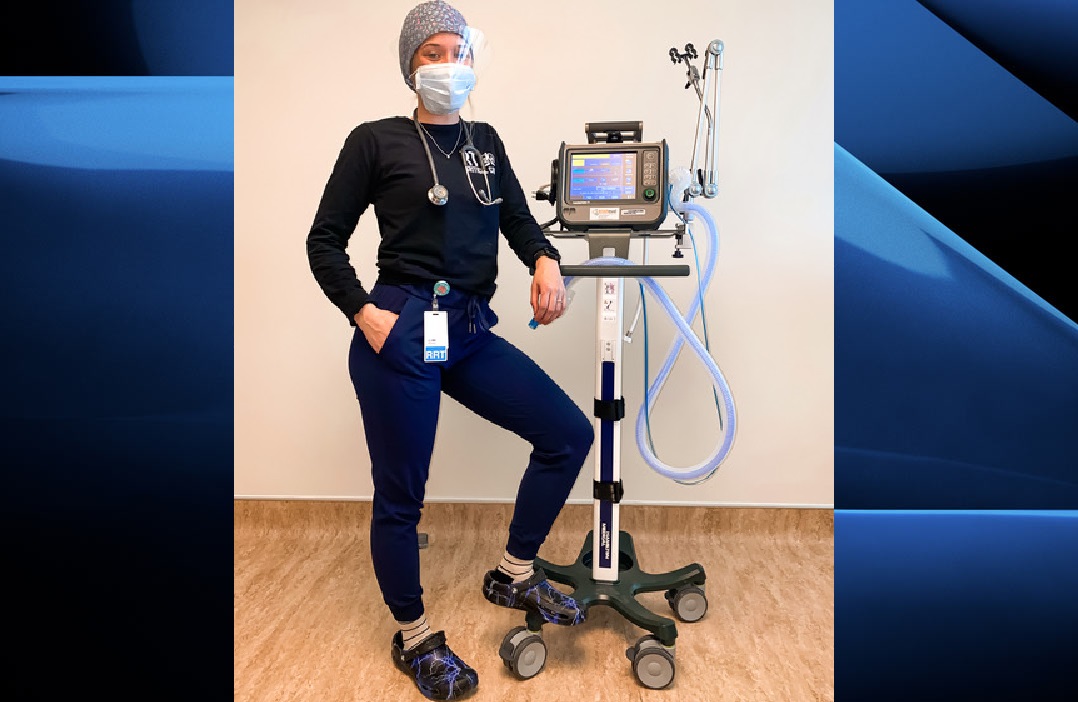In March 2020, Keanna Alcock found herself caught in a whirlwind of emotions.

Just a couple weeks prior, the World Health Organization had declared a global pandemic tied to the outbreak of COVID-19.
Hoping to prevent a medical field from being stretched too thin, the College of Respiratory Therapists of Ontario reached out to several schools in the province with the aim of fast-tracking certifications in order to boost Ontario’s workforce.
Fanshawe College’s respiratory therapy program answered the call and Alcock was among 43 third-year students given early licensing and sent to the front lines just weeks before graduation.
“It was the best thing that could possibly happen,” Alcock said. “Getting that opportunity to jump right in and help — it was a great, fulfilling feeling.”
Alcock received an early start to her dream job at St. Thomas Elgin General Hospital (STEGH).
Having previously worked there as a student, Alcock was grateful to launch her career in a familiar hospital.
“It was a little overwhelming. … You hit the ground running in that situation and I just dove right in. I had lots of help from my coworkers,” Alcock said.

It wasn’t long into her new role as a healthcare hero that Alcock would experience some of the struggles that come with being a front-line hospital worker during the pandemic.
During her first week at STEGH, Alcock received notice from her landlord that she was getting kicked out of her rental house in London, Ont.
“My roommate, that I didn’t really even have contact with, found out that I got a job at a hospital. She talked to the landlord. The landlord contacted a lot of services … and said if I wasn’t out, I’d have to be escorted out by the police,” Alcock said.
“I was homeless for at least a week. I had a bed set up in my car, ready to park it in a parking lot until I could find a place.”
Alcock eventually found a temporary home after she got in contact with Brenda Brandt, the general manager for Windermere Manor. In April 2020, the hotel and conference centre near Western University reopened its doors for frontline medical workers.
“She housed me for a couple months there, free of charge. They gave meals,” Alcock said.
“There was a lot of us there. There was a couple of physicians there, there were doctors, there were nurses there. There was a couple of respiratory therapists there that didn’t want to live with their families to not bring the virus home.”
Alcock was able to find stable housing afterwards, with Brandt’s daughter offering a room in her house for the respiratory therapist to rent.

Alcock continued to grow into her new career as the pandemic rolled on, but it wouldn’t be until the second wave that the reality of COVID-19 really sunk in.
“I can remember the exact day … Dec. 23,” Alcock said.
Amid an influx of patients coming into the emergency room “one by one” and back-to-back calls to STEGH, the hospital ran out of available ventilators.
“There’s two of us. My coworker was stuck in a negative pressure room doing a crash intubation. I was running around the rest of the hospital, going to deliveries, running to emerge, going to the floors and trying to deal with all of the other patients in the unit,” Alcock said.
“Thank goodness that night, nobody else had to be intubated to be put on a ventilator. … That was kind of my first ‘oh sh**’ moment of my career.”

Now 23, Alcock continues to work tirelessly for Ontario’s health care system.
Splitting her time between STEGH, Collingwood General and Marine Hospital, and Orillia Soldiers’ Memorial Hospital, Alcock says she hasn’t had a day off since January.
“The majority of my coworkers are working at two or three different hospitals just to try to help right now in the pandemic because every hospital is needing as much help as they can. I can name at least 10 to 12 (co-workers) that I know also haven’t had a day off since January,” Alcock said.
As Ontario grapples with the third wave of the pandemic, Alcock said the current situation is nothing like she’s ever seen before.
From dwindling space in intensive care units to ventilators being taken up by an increase in patients, Alcock said she’s witnessing firsthand how fast hospitals are filling up.
“It’s indescribable what we’re seeing in there,” Alcock said.
Despite the busy schedule, Alcock is able to find inspiration in her more experienced coworkers, telling herself that if they can keep up, so can she.
While the past year of her life has “just been work,” Alcock said she tries to spend as much time as possible outdoors in order to make use out of the few hours she has between back-to-back 12-hour shifts.
Alcock said it also helps that every day on the job is filled with moments that keep her coming back.
“A day can consist of going to delivery, so you feel new life being brought into the world. … Then you see an elderly person come into emerge that can’t breathe and you’re that person that allows them to breathe. … We extubate somebody off the ventilator and they’re able to make their first words after being on the ventilator for months or weeks,” Alcock said.
“Everything you do is kind of reassuring that this is the career for me and that this is what I love to do.”

Alcock said she still maintains a close connection with Fanshawe, the college that approved a head start to her career.
She works with her former professors David Wall and Greg Donde at STEGH and is able to keep in touch with her former classmates, who were also sent early into the frontlines of the pandemic.
Fanshawe’s work in allowing its students to receive early licensing earned the college national recognition, with its respiratory therapy program receiving Colleges and Institutes Canada’s gold program excellence award last week, an award that Alcock said is well deserved.
“In any career that you can possibly have, I think that first year is a staple year for your growth and development,” Alcock said.
“Doing that on top of a pandemic, you grow a lot of thick skin.”










Comments